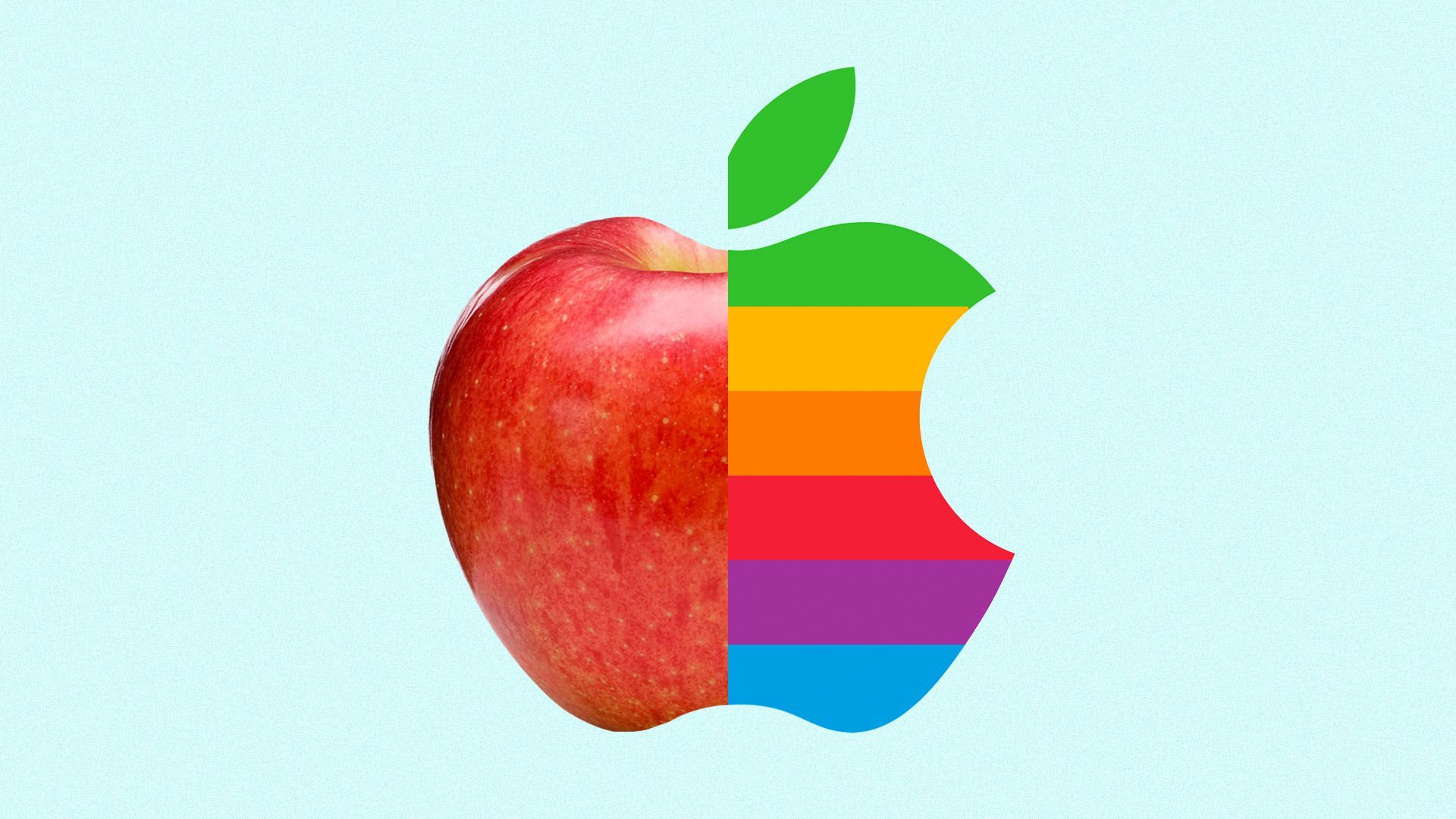Apple's fight to separate online from IRL
Add Axios as your preferred source to
see more of our stories on Google.

Illustration: Sarah Grillo/Axios
Apple's longstanding rule for calculating its cut of transactions enabled through its iOS App Store depends on an apparently simple principle: If a good or service is digital, Apple takes 30%. If the good or service is physical, Apple doesn't.
The catch: Life doesn't divide neatly that way any more.
The big picture: Even before the pandemic, the line between our daily activities and the online world had grown fuzzy, as apps enabled rides, meals, payments and more.
- Then COVID-19 pushed office work, school work and so much else online, and the distinction between "real life" and digital life became even harder to draw.
Why it matters: Apple's effort to maintain a consistent policy could turn into a treacherous tarpit for the iPhone maker, the way misinformation and content moderation have for Facebook, exposing the company to criticism from many directions and sullying its reputation.
How it works: If you sell most anything digital in the App Store, Apple takes 30% of the price.
- For years, Apple has told app makers that if they are giving away an app free and then using that app to sell users physical goods and services — like rides (Uber and Lyft) or meals (Grubhub and Doordash) — Apple wouldn't take a cent. Apple likes to point to how much of the app economy is business done this way.
- But if an app sells users digital goods and services, the 30% fee kick in.
- More recently Apple added a wrinkle, exempting a class of "Reader" apps from the 30% cut. "Readers" are apps users employ to access digital-only goods they've paid for elsewhere — think Netflix, Spotify, or Kindle.
- Even more recently, Apple dropped its commission fee for recurring subscriptions to digital products to 15% after the first year.
Driving the news: Apple's recent legal war with Fortnite maker Epic Games seized headlines, but that conflict doesn't push the limits of Apple's rules.
- The features and goods that Epic wants to sell commission-free in its games are inarguably digital in nature.
- Other recent spats over App Store policies that involved well-known software developers WordPress and Basecamp hinged on more subtle category distinctions. Mostly, they showed that Apple's rules have become so complex that the company is making high-profile mistakes.
One case that shows the long-term risk in Apple's digital/physical policy involves Airbnb.
- A few years ago the rent-out-your-room app started a new line of business called Experiences, allowing its hosts to sell classes, tours and other in-person events. Apple took no cut since these were "physical world" offerings.
- After the coronavirus pandemic forced these entrepreneurs to move these Experiences online, Apple started asking for its 30%.
- ClassPass, an app for booking exercise classes, found itself in the same boat when the pandemic hit and teachers shifted to virtual instruction.
- The New York Times reported both incidents and said Airbnb and Apple are still trying to negotiate a settlement.
Apple's defense: The tech giant argues that...
- Running the App Store costs money.
- It has the right to establish the ground rules for its platform.
- Those rules keep users safe from malware, porn and spam.
It also points to the cornucopia of commerce and developer growth the iPhone has enabled.
History lesson: When the App Store launched in 2008, Apple's 30% cut looked like a steal compared with what wireless carriers and others charged software developers and the higher share that brick-and-mortar retailers took.
- Today, as direct-to-consumer distribution has become the norm in many markets, more companies want the option to go it alone.
Yes, but: Apple already sits on an unrivaled hoard of treasure at a moment when millions of small businesses and individuals are hurting financially.
- 30%, even if it is in line with what other platforms claim, is a very large cut.
- Apple is in the middle of a major push to find new revenue in digital services as growth in the smartphone market tails off.
- The power Apple wields over App Store developers has already piqued the interest of antitrust regulators at the Department of Justice, the Federal Trade Commission, and many state attorneys general, and CEO Tim Cook took heat from Congress at a recent House hearing. (A virtual event, yet one with high real-world impact.)
Our thought bubble: Apple is the only one of today's tech giants to make most of its profits producing and selling physical goods, so it may have faith in the enduring distinction between hardware and software, physical and digital. But these categories aren't as concrete as we think.
- Who's to say that a yoga class beamed out through an app is a purely digital experience?
- The teachers are moving in their physical space. The students are having their own physical experiences. All that's digital is the channel that connects them.
What's next: The rise of augmented reality apps, which use VR-style technology to overlay the real world with digital information and enhancements, promises to further entangle the digital and physical categories.
